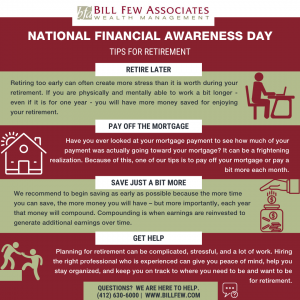Today is National Financial Awareness Day, and while this day is not widely known or as popular as other holidays, its purpose is significant. This day is a reminder to get your finances in order so you can be prepared for your future. Being financially aware can play a major role in how you spend the rest of your life and how prepared you are for what is ahead.
While there are several ways to think about finances, one of the main financial categories that many focus on at some point in their lives is retirement. The category of retirement is an important one as it involves planning how you will spend your golden years, the years that many look forward to for vacationing and taking time for yourself. So, with today being National Financial Awareness Day, let’s take a few minutes to talk about retirement and how to be financially aware and prepared with the following tips:
- Consider Working Longer – This is a touchy subject, but one that is important to mention. When many people think about retirement, they look forward to the time when they do not have to work and can enjoy life more hence giving them the urge to rush to retire. Retiring too early can often create more stress than it is worth during your retirement. If you are physically and mentally able to work a bit longer – even if it is for one year – you will have more money saved for enjoying your retirement.
- Increase Retirement Amount – One way to help your investments benefit over the long run is by increasing your retirement amount, even if it is by 1%. If you can increase by more than 1%, go for it, but starting out small will help avoid the feeling that you are missing a large chunk of your paycheck each month. With that being said, saving 15% of your paycheck each month for retirement is ideal.
- Pay Off Your Mortgage – Have you ever looked at your mortgage payment to see how much of your payment was actually going toward your mortgage and not taxes or interest? It can be a frightening realization. We have all been there. Because of this, one of our tips is to pay off your mortgage or pay a bit more each month. If this is not an option for you, perhaps you can look at refinancing so you can lower your interest rate. There are a few scenarios where it might not make sense for you to pay off your mortgage before retirement, such as if you are earning more on your investment portfolio than you are paying in interest on your mortgage, and these are the types of scenarios an experienced financial advisor can provide guidance on so you can make the right choices for your situation.
- Plan for Inflation – When you plan for retirement, you cannot plan as if everything will be the same as it is today on the day you retire and especially years into your retirement. You need to plan for inflation. A few ways you can do this is by getting the most out of your social security which includes automatic cost of living adjustments as well as investments that rise because of inflation.
RELATED: Learn about the age milestones in retirement planning.
- Be Aware of Tax Implications and Penalties – Have a strategic plan in place for how and when to withdraw money so you can avoid tax implications and penalties as best as you can. For example, depending on your retirement accounts and when you do or do not withdraw, there can be tax implications and penalties when withdrawing money too early as well as penalties for missing a required withdrawal.
- Monitor Spending and Create a Retirement Budget – Monitor your income and expenses so you can use these numbers to help you figure out how much you should budget for spending once you are retired. Also, it is highly advised to agree on this with your spouse so that you both are on the same page. The last thing you want in retirement is to be confronted with unexpected spending differences between you and your spouse.
- When Should I Start Saving? – The answer here is one you might expect. We recommend that you start saving as early as you possibly can, ideally in your 20s. We realize this is not the case for many people, so as early as you can start saving for retirement within your specific situation is key. The reason we recommend saving as early as possible is because the more time you can save, the more money you will have – but more importantly, each year that money will compound. Compounding is when earnings are reinvested to generate additional earnings over time.
- Hire an Experienced Financial Professional – Planning for retirement can be complicated, stressful, and a lot of work. Hiring the right professional who is experienced can give you peace of mind, help you stay organized, and keep you on track to where you need to be and want to be for retirement.
Being aware of where you are financially and where you want to go can change your future. Take time today and every day to focus on your finances, and take the next steps to get help from an experienced financial advisor to make a plan so you can be on your way to meeting your financial goals.
At Bill Few Associates, we do everything to give your retirement maximum lifestyle with minimal hassle. Call us today at 412-630-6000 to find out how we can help you achieve the retirement you desire. Our experienced financial advisors are here to help.
Our experienced financial advisors are here to help. Give us a call.
(412) 630-6000
(800) 245-5939
(412) 630-6001 fax


